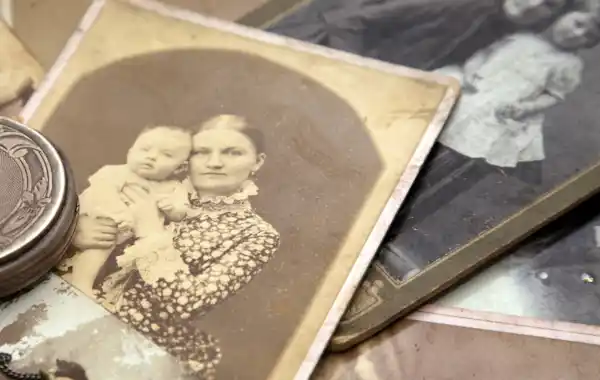16 January 2025
|
A maiden name is a woman's surname before marriage, and uncovering it can reveal hidden branches of your family history. It’s not merely a detail to be remembered when researching, it’s a connection to her origins, her family, and her identity before her life changed through marriage, and it's vital for family history, as our guide to maiden names reveals.
Put simply, a maiden name is the family name of a woman before marriage - usually her father's surname or her mother's surname if she was unmarried.
Today the tradition of taking your husband's name is not as widespread as it used to be, with some people choosing to keep their own family name and give their children 'double-barrel' surnames to reflect the family names of both parents. But in times gone by the large majority of women would take the husband's family name upon marriage.
This means it can be harder to research female ancestors. In fact, according to Findmypast, 70% of unknown individuals in family trees are women. So let's put that right by being determined and diligent researchers!
Quick links
Why recording maiden names is important for family history
In genealogy, capturing maiden names helps paint a fuller picture of your family tree.
Imagine trying to trace your maternal lineage without knowing your great-great-grandmother’s surname before she married.
The challenge of finding maiden names and when to use them
It’s no secret that finding maiden names can be tricky. In the past, women were often identified by their husband’s surname in official records, leaving their birth family’s name behind. This practice can feel like hitting a brick wall when researching, but don’t worry — there are ways to break through.
When searching for records, use the name the person would have used during the specific time period. For example:
- To find records of your great-great-grandma as a child, search using her birth name
- To locate information about her later in life after she has got married, use her married name
Where can I find an ancestor's maiden name?
If you’re stuck trying to find a maiden name, try exploring these key resources:
Finding maiden name clues on marriage certificates
Marriage documents are the obvious place to start, since this document marks the moment the ancestor gave up her maiden name, but it is not always that simple.
- If the bride is marrying for a second time, the surname on the certificate may her previous married name
- The bride's maiden name might be inferred from her father's name, if listed
- If the father listed is a stepfather, his surname may not match the bride's maiden name
- Look at the witness's surname - could this be the maiden name, if the bride herself is recorded by the surname from her first marriage, for instance. The witness could have been a sibling or close relative on the same side of the family
- Don’t forget to check related documents like marriage banns, announcements, and even divorce records in case additional or alternative clues are recorded.
Scottish certificates are a little easier, as they more than often record the original maiden name. For instance, Scottish marriage certificates have recorded the names of the mothers of the bride and groom - including the maiden names for the mothers - since the inception of the civil records in the mid-1800s. (For England and Wales marriage certificates have only included mothers' names since 2021; prior to that the names of mothers were very largely not included on marriages certificates in England and Wales). On Scottish records maiden names are likely to be prefixed with 'M.S.' - for Maiden Surname. You can search for Scottish Records at the Scotland'sPeople website.
Finding maiden name clues in birth records
A mother’s maiden name is often recorded on her children’s birth or baptism records. This can be one of the easiest ways to find that missing name.
- The General Register Office provides a public index that lists basic details of every birth recorded in England and Wales since 1837.
- Birth indexes are available to search on the free-to-use website FreeBMD.
Other documents that may include maiden name
- Census records: sometimes, you’ll find extended family members — like a woman’s unmarried siblings or parents—living in the same household. These connections can reveal her maiden name.
- Church records: baptisms and marriages often list witnesses or sponsors who might be maternal relatives.
- Cemetery or gravestone information: sometimes gravestones or cemetery records include the maiden name.
- Newspaper records: may include marriage announcements showing the bride's maiden name.
- Military records: pension records may show the maiden name.
- 1939 National Register: first taken on 29 September 1939, this record remained in use until the 1990s. As such when women subsequently married and change their names, this was recorded on the register.
Another top tip is to look out for common names that appear repeatedly in your family tree. Sometimes children were given their mother's maiden name as their middle name in order to keep that connection to their original family name, this applied to both sexes, but is more common with girls.







